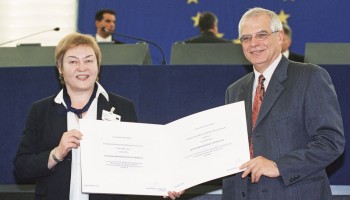Victor Babariko, the chief executive of a Russian-owned bank, was arrested two months before last year’s summer elections which Alexander Lukashenko, who has ruled Belarus with an iron fist for 27 years, won. The vote was marred by vote-rigging allegations and Lukashenko’s victory led to mass protests.
The authorities charged Babariko of committing financial crimes while in charge of the Belarusian arm of Belgazprombank. He’s been held in custody ever since his arrest last June.
Crowds swarmed the courtroom to hear Babriko’s trial last week. The Belarusian Supreme Court sentenced him to 14 years in prison. The verdict is final and not subject to any appeal. The verdict led to new protests.
Babariko has to pay damages worth 46 million Belarusian rubles (US$17 million), and an additional $53,000 fine. He is also stripped of his right to hold any leadership positions in the future.
Colleagues of Babariko are also facing jail time. Seven former employees of the bank were sentenced to prison times between three and six and a half years.
Activists and foreign diplomats have spoken out against Babariko’s sentencing, condemning it as politically-motivated. Babariko was the most prominent person opposing Lukashenko in last year’s highly contested elections.
Western nations have recently fought Lukashenko’s authoritarian rule with sanctions, especially after he grounded a Ryanair flight to detain the opposition activist Roman Protasevich, who was on board.
The sentencing of Babariko week is widely viewed as part of Lukashenko’s latest effort to crackdown on dissidents and keep power.
The U.S. embassy wrote on Twitter that "the cruel sham of the Belarus court system is on display today...showing the Lukashenko regime will stop at nothing to keep power.” On Telegram, the exiled political leader, Sviatlana Tsikhanouskaya, echoed that: “This is a senseless sentence.”
Babariko maintains that he is not guilty and that during his tenure as the head of Belgazprombank "not a single illegal action or coercion was allowed.” The court concluded otherwise.
Still, even as Babariko faces a future in a maximum security prison, he has clung onto hope for the future of his country. Before his trial, he said that he still believes one day there will be a “happy, honest, and open Belarus.”






